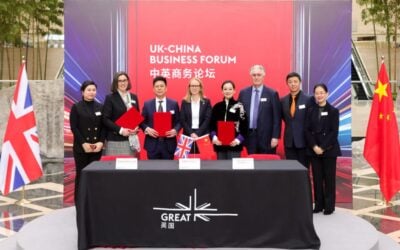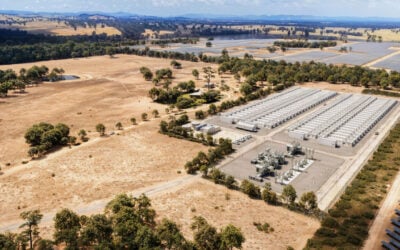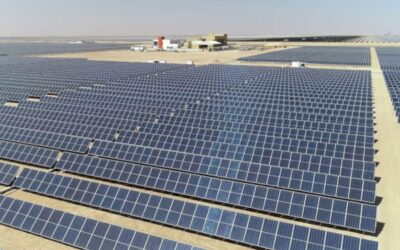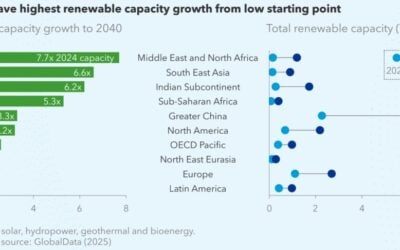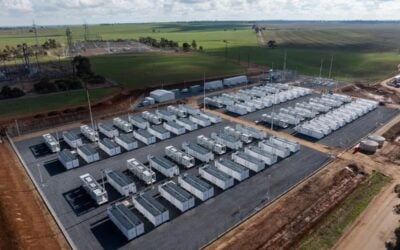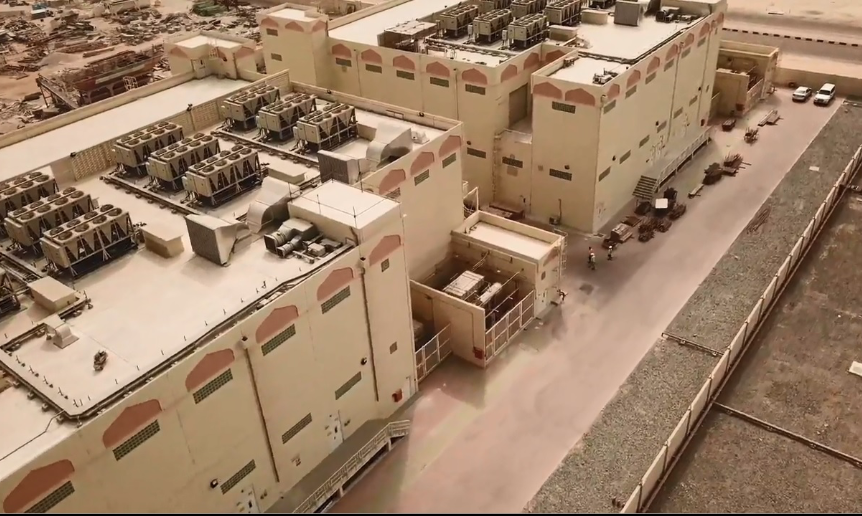
Sodium sulfur (NAS) batteries produced by Japan’s NGK Insulators are being put into use on a massive scale in Abu Dhabi, the capital of the United Arab Emirates.
The company’s battery systems have been deployed across 10 locations – 15 systems in total – adding up to 108MW / 648MWh in total, with each system able to store energy for six hours. The total undertaking includes 12 x 4MW systems and three 20MW systems. The official government Emirates News Agency described the project as the “world’s largest Virtual Battery Plant” as it opened earlier this month.
A representative at NGK’s power business division told Energy-Storage.news the ‘virtual’ description is correct in the sense that the 15 systems in 10 locations “can be controlled as a single plant. While of course they can still be controlled individually when local support to the grid is needed”.
Critical to this aggregation of the systems is the CISC (Centralised Integrated System Controller) which will be located at a control room in Mussafah, an industrial district in Abu Dhabi’s southwest where some of the battery systems are also located, with the rest in nearby Sila. CISC and the NAS systems are “ready to be operated by the TSO (transmission system operator)”, the NGK representative said.
Try Premium for just $1
- Full premium access for the first month at only $1
- Converts to an annual rate after 30 days unless cancelled
- Cancel anytime during the trial period
Premium Benefits
- Expert industry analysis and interviews
- Digital access to PV Tech Power journal
- Exclusive event discounts
Or get the full Premium subscription right away
Or continue reading this article for free
Operational parameters increased from original scope
Awaidha Al Marar, chairman of Abu Dhabi’s Department of Energy, attended an inauguration event on 17 January, as a number of events including Abu Dhabi Sustainability Week and World Future Energy Summit (WFES) took place in the region.
The NGK CISC 648MWh project will help the city load balance across its networks during the daytime, as well as providing up to six hours backup in the case of grid outages. As with many energy storage system projects, it is primarily about reducing the strain on the grid at times of peak demand.
According to the NGK representative, the project was originally planned as thermal generation investment deferral, to reduce the cost of network operations and maintenance (O&M) and to increase total system efficiency, “as well securing that diesel will not be used anymore for peak load”. However, as the project was mapped out and development began, other services were added: frequency control, operating reserve and voltage control.
Why sodium sulfur over lithium-ion
While many grid-scale battery projects around the world are currently being executed with lithium-ion batteries, in this instance, the use of sodium sulfur, allowing for six hours of storage, is “mandatory for thermal generation investment deferral”, the NGK spokesman said, with the peak demand period being shifted itself lasting around six hours.
“[Deploying] 1MW of battery energy storage systems allows avoiding the investment in about 1.1MW of combined cycle (gas and steam) thermal power plants,” by increasing availability by about 10%, while O&M costs for battery systems “are much lower” than equivalent costs for thermal generation plants.
Energy-Storage.news asked what made the NAS battery particularly suitable for the Abu Dhabi project. The NGK representative said that the six hours of storage in each battery cell reduces total system cost versus lithium batteries. Lithium-ion systems tend to combine several one-hour duration battery cells, “which increases the integration costs”. NAS battery systems are also less sensitive to external temperature conditions. There is no need for air-conditioning to keep cells at the right operating temperature – unlike lithium batteries, NAS batteries are insulated and operate at about 300 degrees centigrade. Due to the insulation, it is still safe to touch the exterior of the module with bare hands. The NGK representative explained further that the rugged nature of the batteries and the ways they can be used provide further compelling reasons to use them in the Middle East.
NAS batteries are robust for the kind of heavy use – charging and discharging the battery each day in a full cycle from 100% state-of-charge to 0% i.e. a full 100% depth of discharge (DOD), which make generation investment deferral possible. The batteries are expected to last “15 years without degradation at system level”.
In November, Energy-Storage.news reported on the inauguration of a 20MWh NGK NAS battery project in Niedersachsen, Germany, combined with 7.5MW / 2.5MWh of lithium-ion batteries from Hitachi Chemical. That will be a three-year demonstration, developed through Japan’s NEDO (New Energy and Industrial Technology Development Organisation) and Niedersachsen’s Ministry for Economics, Labour and Transport, as well as authorities in the City of Varel where the demonstration project is located.
Seeds of energy storage’s future
The 648MWh project marks the second announced deployment of NGK NAS batteries in the Emirates, with Dubai Electricity and Water Authority (DEWA) announcing in August last year that it will test a 1.2MW / 7.2MWh NGK sodium sulfur battery system at Mohammed bin Rashid Al Maktoum Solar Park.
Also during January, a Smart Grid Station (SGS) was inaugurated in Al Ruwayyah, Dubai by Dubai Supreme Council of Energy chairman Sheikh Ahmed bin Saeed Al Maktoum. Again, a DEWA project, the SGS was deployed in partnership with South Korea’s state-owned Korea Electric Power Corporation (KEPCO).
DEWA and KEPCO have been exchanging experiences and best practises knowledge with each other on smart city and smart grid topics, including standardisation. The Internet-of-things technology-backed SGS combines a 200kW PV system with 9kW of wind energy and a 500kWh battery energy storage system. It also uses a large thermal energy storage system which provides cooling and a smart chiller system integrated into the SGS’ building management system. The DWA-KEPCO project has been in the making since November 2015.

